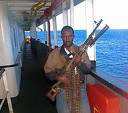|
Crisis
meeting over Somali piracy

A spate of pirate attacks off the coast of Somalia has prompted
an emergency meeting between nations bordering the Red Sea to deal
with the problem.
Senior officials from Egypt, Jordan, Saudi Arabia, Sudan and Yemen
are meeting in the Egyptian capital, Cairo.
It comes amid claims that pirates who hijacked a Saudi oil tanker on
Saturday are demanding a $25m (£17m) ransom.
However, a spokesman for the tanker's owners has cast doubt on the
demands, which were reported by AFP news agency.
The Sirius Star, the biggest tanker ever hijacked, is carrying a
cargo of 2m barrels - a quarter of Saudi Arabia's daily output -
worth more than $100m.
It is now anchored off the Somali coast with around 25 crew members
being held as hostages.
A pirate on board the vessel calling himself Mohamed Said told AFP
that the owners, Vela International, had been set a 10-day deadline
to hand over the ransom.
"The Saudis have 10 days to comply, otherwise we will take action
that could be disastrous," he said, without elaborating.
A spokesman for the Egyptian foreign ministry, Hossam Zaki, was
quoted by Egypt's official Mena news agency as saying that "all
options are open" in trying to solve the crisis.
On Wednesday, Saudi Arabia's foreign minsiter confirmed that the
ship's owners were negotiating with the pirates.
'Fundamental problem'
The 25 captive crew on the Sirius Star include 19 Filipinos, two
British citizens, two Poles, one Croatian, and one Saudi national.
UK Foreign Secretary David Miliband said he could not comment on
negotiations.
However, he did say: "There is a strong view of the British
government, and actually the international community, that payments
for hostage-taking are only an encouragement to further
hostage-taking and we will be approaching this issue in a very
delicate way, in a way that puts the security and safety of the
hostages to the fore."
With Britain's Royal Navy co-ordinating the European response to the
incident, Mr Miliband said: "There is a fundamental problem in the
Gulf of Aden. That is why the deployment of the European force is
the right thing to do."
The pirates who seized the tanker on Saturday are a sophisticated
group with contacts in Dubai and neighbouring countries, says BBC
Somali Service editor Yusuf Garaad.
Much of their ransom money from previous hijackings has been used to
buy new boats and weapons as well as develop a network across the
Horn of Africa, he adds.
Russia has announced it is to send more warships to the region to
counter the pirates.
Earlier this month, one of its destroyers, the Neustrashimy, scared
away pirates who were trying to hijack ships in the Gulf of Aden.
"After the Neustrashimy, ships from other fleets of the Russian navy
will head to the region," Admiral Vladimir Vysotsky said.
There has been a surge in piracy incidents off the coast of Somalia
this year.
On Tuesday, a cargo ship and a fishing vessel became the latest to
join more than 90 vessels attacked by the pirates since January.
In a rare victory against the organised gangs, the Indian navy said
it had sunk a suspected pirate "mother ship" in the Gulf of Aden,
several hundred kilometres north of the location where the hijackers
boarded the Sirius Star.
INS Tabar attacked the vessel on Tuesday after it failed to stop for
an inspection and opened fire, the Indian navy statement said in a
statement.
Shipping companies are now said to be weighing up the risks of using
the short-cut route to and from Europe via the Gulf of Aden and the
Suez Canal.
However, travelling around South Africa's Cape of Good Hope would
add several weeks to average journey times and substantially
increase the cost of goods for consumers.
Source:BBC
|